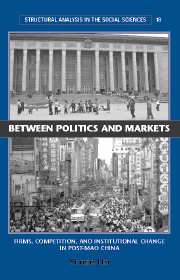Book contents
- Frontmatter
- Contents
- Tables and Figures
- Acknowledgments
- Introduction: Economic Market and Political Market
- 1 Chinese Industrial Enterprises: A Bird's-Eye View
- 2 Central Planning and Its Decline
- 3 The Rugged Terrain of Competition
- 4 Referee as Player: Menaces and Opportunities for Industrial Firms
- 5 Erosion of Authority Relations: A Tale of Two Localities
- 6 Favor Seeking and Relational Constraints
- 7 Competition, Economic Growth, and Latent Problems
- Conclusion
- Appendix A Statistical Data Sources
- Appendix B Methodological Note on Case Studies
- Bibliography
- Index
6 - Favor Seeking and Relational Constraints
Published online by Cambridge University Press: 15 July 2009
- Frontmatter
- Contents
- Tables and Figures
- Acknowledgments
- Introduction: Economic Market and Political Market
- 1 Chinese Industrial Enterprises: A Bird's-Eye View
- 2 Central Planning and Its Decline
- 3 The Rugged Terrain of Competition
- 4 Referee as Player: Menaces and Opportunities for Industrial Firms
- 5 Erosion of Authority Relations: A Tale of Two Localities
- 6 Favor Seeking and Relational Constraints
- 7 Competition, Economic Growth, and Latent Problems
- Conclusion
- Appendix A Statistical Data Sources
- Appendix B Methodological Note on Case Studies
- Bibliography
- Index
Summary
With the persistence of particularism in state action and the expansion of exchange relations in the political arena, how firms fare in favor seeking has a direct impact on their competitiveness and profitability, as shown in Chapters 3 and 4. What, then, affects the ability of firm leaders to manipulate state action? In particular, what shapes the differences between state and nonstate enterprises in the effectiveness of their efforts to have the rules of the new economic game bent to their advantage and to profit from market-oriented economic activities?
To address this issue, it is important to examine both the means and the contexts of favor seeking. A widely noted phenomenon in studies of China's post-Mao transformation is that economic actors have made extensive use of guanxi – personal networks – as the main avenue of favor seeking. The focus of attention centers on the role of guanxi as a mediating mechanism, and the predominant approach to the analysis of this role is to examine it in terms of dyadic interactions between the parties involved in favor exchange. Much has yet to be said, however, about what shapes the outcomes of guanxi-mediated favor exchange, especially in the context of multiple-party interaction where decisions are interdependent between different dyads.
Following the clues developed in the preceding chapter, this chapter takes a close look at the relationship between favor seeking and the characteristics of the political markets faced by different firms.
- Type
- Chapter
- Information
- Between Politics and MarketsFirms, Competition, and Institutional Change in Post-Mao China, pp. 151 - 168Publisher: Cambridge University PressPrint publication year: 2001



